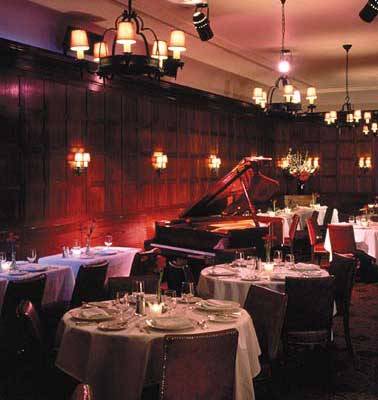The Oak Room of the Algonquin Hotel is no more. According to published reports, it will now become “a lounge for Marriott Reward Elite guests.” The next time you consider staying at a Marriott hotel, remember who committed that act of cultural vandalism.
I published a tribute to the Oak Room a few years ago in which I summed up how I felt about one of the places that made New York New York. Here’s part of it.
* * *
Eighty well-dressed people sit silently in a darkened, oak-paneled room in the center of Manhattan. Some have plates of food in front of them, others have drinks at their elbows, but nobody is paying much attention to food or drink right now, not even the waiters. Instead, they’re all listening to a woman seated on a high stool placed in the bend of a piano, her handsome face lit by a single baby spotlight. Her name is Weslia Whitfield, and she’s singing a song everyone here knows by heart: Somewhere over the rainbow/Bluebirds fly/Birds fly over the rainbow/Why then oh why can’t I? It takes a lot of nerve, and a lot of talent, to sing a song like that in a room like this. The woman has both, which is why the crowd is so quiet: you could hear a pin drop across the street.
 The song ends, and the crowd cheers–decorously (for this is a decorous room), but nonetheless enthusiastically. As the applause swells and the waiters start stalking through the room once more, Weslia Whitfield grins her crinkly-eyed, I’m-having-fun grin and nods her head in acknowledgment of the hubbub. She knows what she just did: she stopped the show in the Oak Room of New York’s Algonquin Hotel. For a cabaret singer, life doesn’t get much better than this.
The song ends, and the crowd cheers–decorously (for this is a decorous room), but nonetheless enthusiastically. As the applause swells and the waiters start stalking through the room once more, Weslia Whitfield grins her crinkly-eyed, I’m-having-fun grin and nods her head in acknowledgment of the hubbub. She knows what she just did: she stopped the show in the Oak Room of New York’s Algonquin Hotel. For a cabaret singer, life doesn’t get much better than this.
One of the first things I did after I moved to New York City was have dinner at the Algonquin with a group of friends, budding writers all. We sat at a round table in the Rose Room and gazed longingly across the room at another round table–the round table, to be exact. We didn’t say anything about it, because we didn’t have to; we’d all read the same books in high school and college, and dreamed the same dreams. Instead of pointing and gawking, we swapped wisecracks, pretending they were as clever as the ones George S. Kaufman and Dorothy Parker fired off right over there. I kept thinking of the scene in the movie Laura in which the beautiful Gene Tierney accosts the waspish Clifton Webb at lunchtime: it was filmed here. No doubt everyone else at our table, if not the whole room, was thinking roughly similar thoughts. The Algonquin does that to you….
The Algonquin Hotel is still doing business at the same old stand, 59 W. 44th St., just about halfway between Broadway and Grand Central Station. Needless to say, the Round Table is no longer in operation, and more than a few of its once-renowned members are long forgotten. (When did Franklin P. Adams’ name last cross your mind?) But in a city that prides itself on change, the Algonquin prides itself on not changing, and if Noël Coward, Harpo Marx, or William Shawn were to stroll through the front door tomorrow morning, they’d know just where they were. The lobby still has the comfortable air of a slightly down-at-heel men’s club–you ring a brass bell to summon a waiter–and Matilda, the current Algonquin cat, still has free run of the place. Fancy it isn’t; classy it most decidedly is.
A very large part of what makes the Algonquin so classy is what goes on in the Oak Room at night. During the day, it’s a well-lit place to eat lunch, complete with canned music; after dark, it’s New York’s most prestigious supper club, the place where every singer in America who prefers Cole Porter to MTV Unplugged dreams of working. Back in 1939, Frank Case, who ran the hotel throughout its Round Table days, turned the Oak Room into a nightclub whose regular patrons included the likes of Tallulah Bankhead, Greta Garbo, and Hedy Lamarr. But World War II put an end to cabaret at the Algonquin, and it wasn’t until 1981 that the Oak Room again became a venue for American popular song. The singer-pianist Steve Ross, hired on a trial basis, stayed there for four years, and the Algonquin has been presenting cabaret acts ever since….
 What makes the Oak Room so special? Obviously, the singers who perform there are the heart of the matter, though the room itself contributes significantly to the effect they make. Cabaret is an intimate art, and the eighty-seat Oak Room, with its amber sconces and red velvet banquettes, is as up close and personal as a love seat at midnight: there is no finer place to listen to songs of passion and despair. “It’s nice singing in a room this small,” Whitfield says, “because I get feedback from the people. I know what works–and what doesn’t work. When they’re bored, you can hear them scrunching up their toes in their shoes. You can get that kind of response in a larger room, but it’s very slow, and very limited.”
What makes the Oak Room so special? Obviously, the singers who perform there are the heart of the matter, though the room itself contributes significantly to the effect they make. Cabaret is an intimate art, and the eighty-seat Oak Room, with its amber sconces and red velvet banquettes, is as up close and personal as a love seat at midnight: there is no finer place to listen to songs of passion and despair. “It’s nice singing in a room this small,” Whitfield says, “because I get feedback from the people. I know what works–and what doesn’t work. When they’re bored, you can hear them scrunching up their toes in their shoes. You can get that kind of response in a larger room, but it’s very slow, and very limited.”
But the Oak Room’s not-so-secret ingredient, irreproducible at any price, is the fact that it is part and parcel of the Algonquin Hotel. “Lots of famous people slept at the Waldorf,” an old Algonquin hand says sniffishly, “but nobody did anything there.” Well, plenty of people did things at the Algonquin, and not just the members of the Round Table, either. William Faulkner wrote his Nobel Prize acceptance speech there; the New Yorker was practically invented there. Sinclair Lewis actually offered to buy the place. Everybody who sings in the Oak Room knows it isn’t just another club: it’s a piece of history. “There are ghosts here,” says Weslia Whitfield. “But good ghosts. They want you to do well.”
It struck me the other day that America had finally realized Karl Marx’s dream of a classless society: nobody here has any class. But in the Oak Room, all the men wear ties and–at least when the music is playing–all the women look like Gene Tierney, cool and chiselled and enigmatic, thinking their private thoughts as Weslia Whitfield lifts her silvery voice in song. Gangsta rap and grunge rock may rule the airwaves, but in this dark, quiet room, Harold Arlen still prospers. Alec Wilder, another great American songwriter (and longtime Algonquin resident), planned at one time to write a book about the Algonquin Hotel called The Elegant Refuge. Though the book never got written, the title was a perfect fit, and still is. For the middle-aged, the Oak Room is a blessed refuge from the squalor of the present; for the young, it is the classroom in which they learn the lost language of elegance. Long may it reign.
